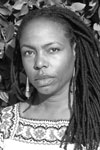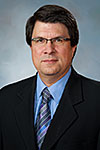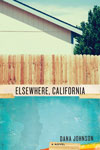Next ABR author lauded for fearlessness in writing about race, class issues
When teaching creative writing at the University of Southern California, Dana Johnson pushes her students to go to scary places.

|
| Dana Johnson |
“People write scenes or dialogue that skirt huge topics,” she said. “I can tell they want to talk about it, but it’s tough for them. I always tell my students, ‘If it’s scary or makes you feel uncomfortable, you have to go there.’”
Johnson, the second author in the Spring 2014 University of Houston-Victoria/American Book Review Reading Series, has drawn praise from critics and readers for her honest and fearless writing. Even if it makes her uneasy, Johnson said she writes whatever she thinks is truthful.
“Sometimes I catch myself worrying about who might be reading this,” she said. “I have to follow my own advice and plow ahead. It helps to pretend no one will read your work. That way, you don’t censor yourself.”
Johnson will read from her 2012 novel, “Elsewhere, California,” at noon Feb. 20 in the Alcorn Auditorium of UHV University West, 3007 N. Ben Wilson St. The public is invited to attend the free event, and light refreshments will be served.

|
| Jeffrey Di Leo |
“I’m looking forward to Ms. Johnson’s visit,” said Jeffrey Di Leo, ABR editor and publisher, and dean of the UHV School of Arts & Sciences. “She does a remarkable job speaking about class, race and culture in her writing. Those are subjects that make some writers uneasy. It will be great for students and local community members to listen and interact with her.”
Born and raised in and around Los Angeles, Johnson is an associate professor of English at USC, where she teaches literature and creative writing.
In 2001, Johnson won the Flannery O’Connor Award for Short Fiction for her book “Break Any Woman Down.” In the collection, Johnson explores the interactions among men and women, women and women, parents and children, whites and blacks, young and old, and the living and the dying, most of whom are vainly searching for a place to be, physically and emotionally.
In one of those short stories, “Melvin in the Sixth Grade,” Johnson introduces 11-year-old Avery, who contends with her recent move to the suburbs from a poor section of Los Angeles.

|
Avery’s character is the central figure in “Elsewhere, California.” The novel traces a single day in the life of 40-year-old Avery interspersed with formative memories from her early childhood through young adulthood. Johnson said she chose the dual-narratives format to show where her main character had come from and where she ended up.
“Rather than have a linear narrative that started with childhood in Chapter 1, I wanted to immediately show the difference between then and now in terms of voice,” she said. “I thought bumping the past and present worlds would be really effective in illustrating the tensions.”
Johnson said the element of the book she’s most proud of is the dual narratives, noting that a big hurdle was shifting voices of characters.
“As Avery gets older, her voice reflects where she lives and how assimilated she’s become living in a mostly white neighborhood,” Johnson said. “Getting all those elements down was hard but fun.”
In the novel, Avery struggles to establish her identity after she and her family escape the sometimes violent streets of Los Angeles to a more gentrified existence. Once in suburbia, Avery disconnects, pulled toward angst and rebellion by her new best friend, Brenna, yet ensnared by the hard-line rules of her strict parents.
Avery eventually attends USC. Although the novel is not autobiographical, Johnson arrived at USC as an undergraduate from a working-class background. While the university has changed quite a bit, Johnson said in the 1980s, USC was viewed as being a higher education institution for a certain segment of the population, and it wasn’t poor black people.
“Since one of my larger themes was class and money, I wanted to write about Avery attending USC because that was a fish-out-of-water moment that would very clearly illustrate issues of class and race,” Johnson said. “If you come from a place not used to money, fancy cars and fancy luggage, it’s really eye opening.”
Other writers scheduled for the Spring 2014 UHV/ABR Reading Series are:
Alex Espinoza, March 6 – Espinoza has authored two books and numerous shorter works. His stories and essays are known for drawing on his Hispanic heritage and describing his assimilation into American culture. “Still Water Saints,” his debut novel, was published simultaneously in Spanish and English. His fictional work has been featured in various anthologies and journals such as The Southern California Review, and his essays have appeared in The New York Times.
Scott Russell Sanders, March 27 – Sanders is the author of 20 books consisting of collections of nonfiction, novels and personal stories. He also is the author of three children’s books and is known for his attention to nature and history in his writings. Through the years, he has collected numerous awards for his work, including the Mark Twain Award and the Lannan Literary Award.
Domingo Martinez, April 24 – Martinez is the author of “The Boy Kings of Texas.” The book explores his experience growing up in the border town of Brownsville and the cultural collision of two countries. Martinez was a nominee for the 2013 Pushcart Prize and a finalist for the National Book Award. He will be the 70th speaker the UHV/ABR Reading has welcomed to Victoria.
Authors will be available after each reading to sign copies of their books, which can be purchased at the events. During her visit, Johnson will meet with students and attend functions in the community.
ABR is a nonprofit, internationally distributed literary journal that is published six times a year. It began in 1977, moved to UHV in 2007 and has a circulation of about 8,000. The journal specializes in reviews of works published by small presses.
For more information about the UHV/ABR Reading Series, call the ABR office at 361-570-4101 or go to www.americanbookreview.org.
The University of Houston-Victoria, located in the heart of the Coastal Bend region since 1973 in Victoria, Texas, offers courses leading to more than 80 academic programs in the schools of Arts & Sciences; Business Administration; and Education, Health Professions & Human Development. UHV provides face-to-face classes at its Victoria campus, as well as an instructional site in Katy, Texas, and online classes that students can take from anywhere. UHV supports the American Association of State Colleges and Universities Opportunities for All initiative to increase awareness about state colleges and universities and the important role they have in providing a high-quality and accessible education to an increasingly diverse student population, as well as contributing to regional and state economic development.
Jeremy Shapiro
361-570-4350




